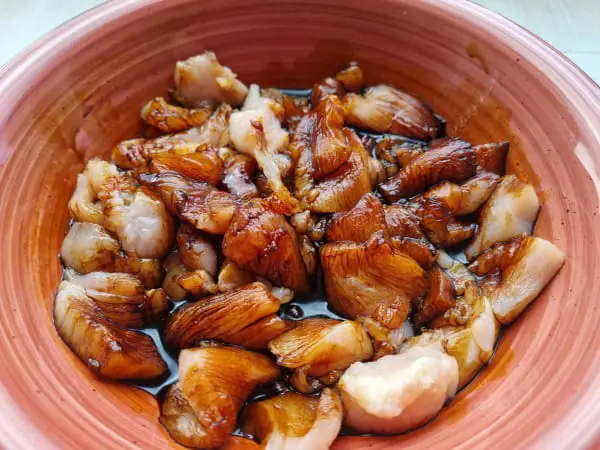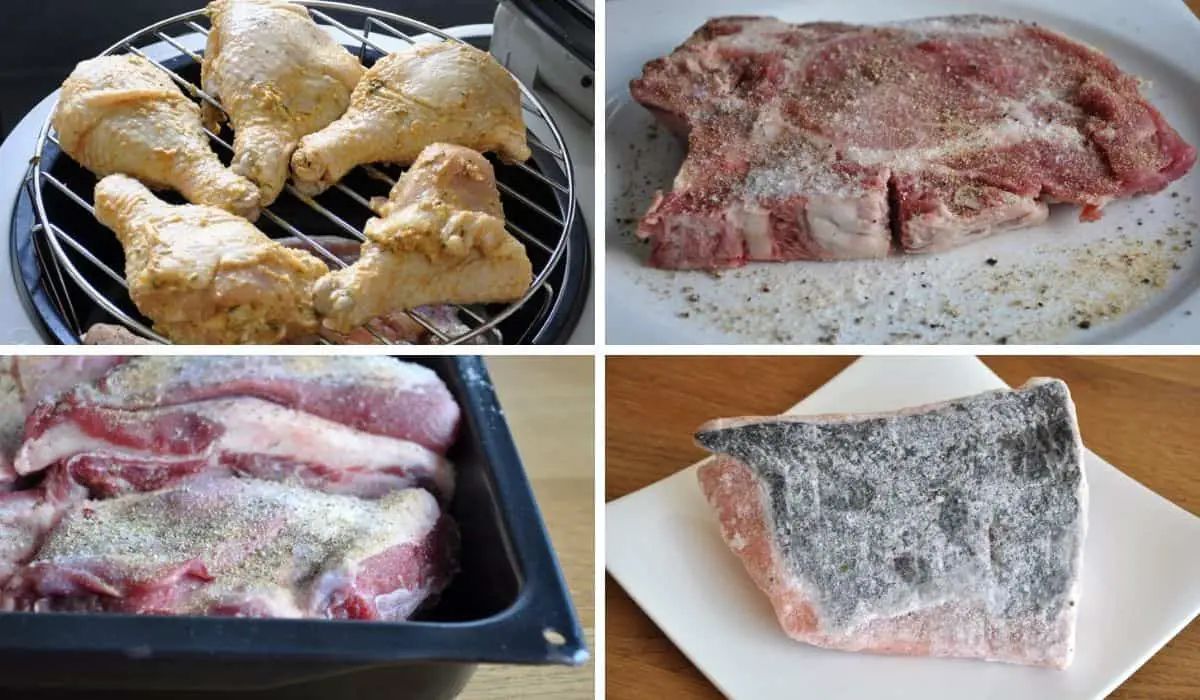Marinating or dry rubbing meat serves two purposes. Meat is marinated to add flavor to it. And secondly, in the case of marinating, it is to tenderize meat that is a little bit tougher.
Marinates often incorporate an acidic ingredient such as vinegar, lemon juice, or wine. The reality, though, is that marinating meat adds time to your preparation. One solution is to pre-season meat before freezing. But, can this be done?
It is perfectly safe to marinate, dry rub, or season most meats before freezing. Overmarinating is not a concern because the freezing process stops the marinating process. However, when the meat starts to thaw, the marinating process will continue again. Keep in mind, though, that freezing certain spices in a dry rub may amplify the flavor of that spice considerably, to the point that it over powers all other spices.
Can you freeze meat with seasoning or dry rub
Yes, most meats can be frozen with a dry rub or seasoning.
| Meat | Can you freeze meat with dry rub season ormarinate |
|---|---|
| Beef | Yes |
| Pork | Yes |
| Chicken | Yes |
| Fish | Yes |
| Venison | Yes |
| Lamb | Yes |
I’ve created a complete guide for each meat. Simply click on the beef, pork, chicken, or fish for more details!
How great would it be if we could cook freshly bought meat every day? But the reality is that most people live a distance away from their local butcher. Buying fresh meat every day simply isn’t a viable option for many.
That’s why most people purchase bulk meat products in advance and store the cut-up pieces in the freezer for later consumption. Thawing is a time-consuming process and so is spicing the products. Many people consider adding a dry rub to the meat before freezing it as a way to add more flavor and save time during the cooking process.
Dry rubs are simply a combination of spices, herbs, and seasonings. There are a plethora of dry rub variations.
ESSENTIAL TOOLS AND EQUIPMENT FOR FREEZING FOOD
Last update on 2025-06-15 / Affiliate links / Images from Amazon Product Advertising API
Various types of meat can be frozen with a dry rub, including beef, pork, as well as turkey and most types of game meat, including venison and wild poultry. In fact, a 2016 study found that many spices have antioxidant properties to help preserve food products for longer.
There are, however, some ingredients to be wary of including in your dry rub. It’s perfectly fine to add these ingredients to fresh meat, as part of the dry rub, before cooking. However, avoid adding these ingredients to a dry rub if the meat is going to be frozen first and these include any type of garlic product.
Many of the dry rub recipes include these ingredients. The problem with freezing any type of garlic product along with the dry rub, will dramatically enhance the flavor of the garlic. This is usually a very overpowering flavor and scent that makes the meat almost unappetizing.
Some spices do not freeze well and tend to become bitter during the freezing process. It may be better to exclude these ingredients from a dry rub before coating the meat and freezing it. Examples include pepper, cloves, garlic, etc.
You could add these ingredients to the dry rub after the meat has defrosted.
So, while it is possible to dry rub or season meat products before vacuum sealing and freezing the meat, some spices should be omitted and only added after defrosting.
Best way to do it
A dry rub is called a dry rub because it does not include wet ingredients such as mustard, oils, or any other ingredient that could transform the mixed spices into a paste.
Take the meat product and pat it dry using a paper towel. Once the meat is suitably dried off and all excess moisture is removed, rub the spice mixture all over the meat. There should still be a sufficient amount of moisture to help the rub stick to the surface of the meat.
If you feel that the rub isn’t sticking to the meat as much as you would like it to, then simply add a few drops of oil to form a paste. Alternatively, you could cover the meat with mustard to help the dry rub adhere better to the meat. Keep in mind that you are going to need to use an oil with a high smoke point if you intend on adding oil to the dry rub. This type of oil holds up well at high temperatures and is great for deep frying or for cooking/ sauteing meat products. Examples include vegetable oil, canola oil, and corn oil.
Make sure that you are getting dry rub all over the meat product including the hard to reach areas and crevices. If you are adding dry rub to individual pieces of meat, it may be best to separate the meat using wax paper. Then, place the meat in a freezer-safe ziplock bag and remove any excess air.
Add a label, date, and product description on each package. In addition, you may want to add cooking instructions.
Alternatively, you could sear fresh meat with the seasoning on it before freezing. This helps the seasoning to adhere to the meat. In addition, when it comes to thawing the meat, the rub has already adhered to the meat so there is little concern that it will wash off during thawing.
Can you freeze meat after salting
Yes. Many meat products, such as chicken, benefit greatly from salting before freezing. In the case of poultry, the meat retains a lot of moisture and may be more juicy after cooking.
Be sure to cut off any excess fat from the meat before freezing.
Most other types of meat also benefit from adding salt before freezing it, as the salt may help retain lost moisture from aging or handling. Traditionally, meat was salted before freezing as a way to prolong the freshness of the meat as well as to ensure that the meat could be frozen for longer.
Can you freeze meat in marinate

Absolutely. All types of meat benefit from freezing in the marinade. Many people are concerned about over marinating when doing this.
Overmarinating is not an issue as the marinating process is completely halted by the freezing process. The meat will only start to marinate again during the thawing process.
Keep in mind that certain products should be marinated for a shorter period of time. This means that pre-freezing and thawing methods should be taken into account when freezing marinated meat. The meat should be placed in the freezer immediately after marinating, and the thawing process should be carefully considered.
Thawing overnight in the refrigerator may allow the meat to marinate past the advised or stipulated timeframe. Thawing in room temperature water for an hour or two, depending on the size of the meat, may be a better option.
Best way to marinate meat before freezing
This step by step guide will help you achive best results;
- Prepare the marinade mix ahead of time.
- Remove any excess fat and/or bones from the meat if possible.
- Section the meat into smaller portions and add each portion to a freezer-safe ziplock bag along with the appropriate amount of marinate.
- Move the meat and marinate around in the bag to ensure that all parts of the meat is fully covered in the marinate.
- Remove as much air from the bag before sealing it.
- Add a label, date, marinate ingredients, and cooking instructions to each bag.
- Freeze immediately.
As previously mentioned, some delicate types of meat, such as fish, may only need to marinate for a short while. Defrosting the meat in room temperature water may be better than defrosting it in the refrigerator over night.
Conclusion
All meats can be dry rubbed or marinated before freezing. Certain spices and ingredients do not freeze well and the freezing process may alter the taste of these ingredients.
It would be best to omit them from the dry rub or marinate until after the product has defrosted. Freezing stops the marinating process but it does continue during thawing. Be mindful of the thawing process with marinated meats and always cook marinated meats within 24 hours after thawing.







